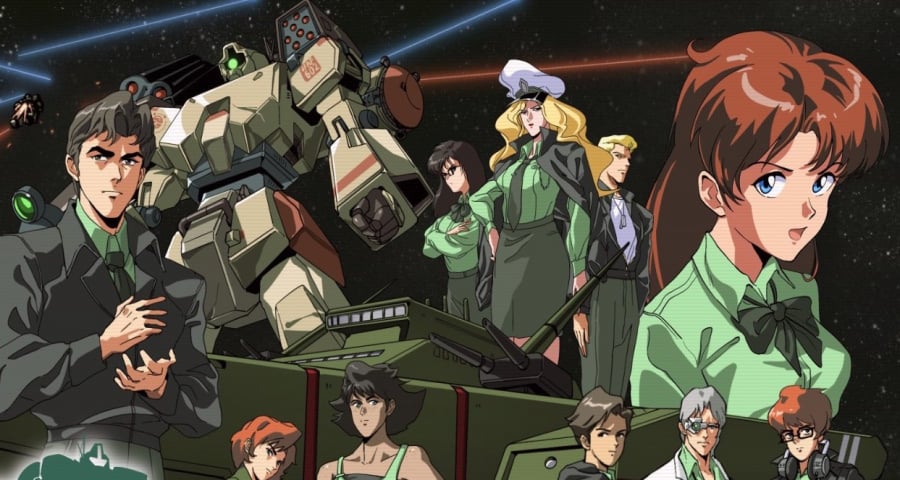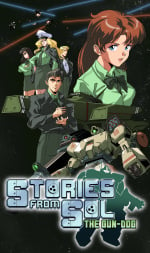
Every so often a game comes along where it's love at first sight, and Stories from Sol: The Gun-Dog is undoubtedly one of those games for us.
A sci-fi-themed adventure game set aboard a spaceship under attack, it features a gorgeous pixel-art aesthetic that draws inspiration from everything from classic Japanese ADVs to '80s and '90s anime.
In the exciting upcoming game, which is scheduled to come to PC, PS4, PS5, and Switch in February 2025, you will play as a newly hired security officer with a traumatic past who must work to protect the ship and its crew from an unknown assailant in deep space. While progressing through the story, you'll develop complex relationships with the various crew members onboard, while also investigating your surroundings for clues as to who might be responsible for sabotaging the vessel.
The game is intended as a homage to the golden days of NEC's PC-98 series of computers and is currently being developed by an international group of developers under the name Space Colony Studios.
Recently we at Time Extension had the chance to interview Jonathan Durham, the creative director and lead writer on the project, to find out a bit more about the origins of the project and what in particular appealed to the Welsh developer about making a Japanese-style ADV. He gave us an insight into some of the major reference points, as well as the tools the team is using to bring the project to life. Enjoy!
Time Extension: To begin, could you tell us a little bit more about Space Colony Studios? Who is working on this project? Where are you based?
Durham: Space Colony Studios currently consists mainly of myself who does the writing and is based in Wales; our programmer Ben and main composer Daniel are in England and our pixel artist Kevin is based in the USA. We’ve had contributions from people all over the world including China and Europe, so the game’s a real international collaboration!
Time Extension: What was the initial inspiration for Stories from Sol: The Gun-Dog? And what have been some of the games that influenced you the most?
Durham: Some of the biggest inspirations for Gun-Dog came from old movies and anime. There’s just as much Blade Runner, Alien, and Terminator in there as there is Martian Successor Nadesico, Mobile Suit Gundam, and Macross. These were hugely influential on the world-building, style, and themes of Gun-Dog. In terms of games, Japanese ADV titles like Policenauts, Snatcher, and Phoenix Wright informed the game’s structure, mechanics, and narrative style.
Time Extension: What can you reveal about the story of the game and the kinds of themes that you wanted to tackle with this project? From the demo, it seems to deal quite strongly with the topic of PTSD, but it also seems like there is a romantic subplot in there as well.
Durham: The last question asked about inspirations and the concept of trauma and how it’s handled is a huge part of Gun-Dog’s narrative, acting as a driving force in the story with every character having been written around different kinds of trauma and how they react to it. Although the game covers a lot of ground that you’d expect in a sci-fi title, it also deals a lot with how trauma is handled and the decisions we all make when it comes to conflicts driven by people’s personal histories.
The romance subplot is also really important. Most media and games deal with romance as an objective or reward that pretty much ends when it’s obtained. We wanted to let players explore a different kind of romance so within the game you’re actually in an established relationship and it’s about how you handle it and the different challenges you can face in that kind of situation. We wanted to offer something a bit different!

Time Extension: What were some of the main considerations that went into the design of the JFS Gun-Dog? Are there any famous sci-fi ships that you tried to model it after?
Durham: There’s a lot of crossover between Eastern and Western designs when it comes to the Gun-Dog. Although we wanted to make it quite clearly its own thing with a distinctive silhouette it definitely draws a lot from the alliance battleships in Legend of the Galactic Heroes and the titular Battlestar Galactica. There’s a little bit of Space Battleship Yamato in there too, most notably the classic naval artillery.
There’s a lot of crossover between Eastern and Western designs when it comes to the Gun-Dog.
Time Extension: The PC-98 was obviously a big influence on the art style and design of the game, as you’ve mentioned on Steam. What was so special about the PC-98 and how it enabled artists to express themselves?
Games from the PC-98 were a real inspiration to us due to how completely unknown it and most of its games are in the West. Even to this day, a huge chunk of its library remains untranslated and unplayable so all you see online are these really alluring screenshots of incredibly presented interfaces and in-game visuals. The fact that so many of these games are still behind a language and hardware barrier gives them the same feeling that Japanese media had in the 90s where it was mysterious and exciting and would really fire up the imagination.
A lot of its titles came out in that early 90s period and act as fantastic examples of the aesthetics of the time as well as being incredible examples of pixel art illustrations that stand up to this day. We wanted to capture some of the spirit of what appealed to us about these games and their visuals and to see if we could achieve it ourselves.
Time Extension: Despite being influenced by the PC-98, the game notably features a green colour palette that is a lot more reminiscent of the original Game Boy. Why did you decide to go for this particular colour palette?
Durham: This is a question we get a lot and it’s got a few different reasons! Initially, before the core concept of Gun-Dog and what it would be was decided we looked into using GB Studio to create a game. At the time GB Studio only supported monochrome visuals so some early character designs were done to take the Game Boy’s four colour palette into account.
When the move to PC was made and we were doing visual research we noticed that a lot of the older science fiction movies used computers that had green phosphorescent monitors (like the MU-TH-UR 6000 from Alien or MacReady’s Chess Wizard in The Thing). Since this kind of technology really serves to communicate the period the movies were made in and we had existing monochrome green designs already we decided to go with the all-green palette to further push the feeling that this game was something of a relic from a past that never was.

Time Extension: What are some of the tools you’ve been using to create the project and why did you pick them?
Durham: In terms of technology used Gun-Dog doesn’t make use of anything too flashy. The pixel art and animation is all done in AseSprite which is an extremely approachable piece of spriting software with an easy-to-use timeline function that makes animating painless. The game engine we use is Renpy which is built from the ground up for visual novels which suited Gun-Dog at its inception and we’ve put in a bit of extra work to get it to work for an ADV game like this. The soundtrack was composed in Famitracker which allowed for a really genuine sound.
Time Extension: Besides the art and the characters, one of the other major things that really stood out to us about the game was the music. What have been some of the major touchstones in that area? Are there any composers in particular that inspired the game’s sound?
Durham: Gun-Dog’s chiptune soundtrack was influenced by anyone who wrote music in the 8/16-bit eras who created the fullest sound they could out of the limited resources they had. Some of the biggest inspirations for Gun-Dog’s soundtrack include people like: Yuzo Koshiro, Masato Nakamura, Koji Kondo, Jun Senoue, Soyo Oka, Junichi Masuda, Tim Follin, Nobuo Uematsu, and also Konami's Sound Team from that era too. There’s no one specific guiding sound though. Instead, our composer Daniel would start with a lot of rough ideas and discover the songs as he went.
Time Extension: And finally, the game is listed for Steam but have you considered yet whether you’ll be bringing it over to any other platforms? Are there any dream platforms you’d like to port the game to?
Durham: Our publishers have recently announced that as well as Steam, Gun-Dog will be getting a release on PS4, PS5, and Switch, including physical editions, which is a dream come true in itself! If I could I’d love to see Gun-Dog running on actual PC-98 hardware but that would require it being coded from scratch and our programmer would kill me if I ever asked him to!
A demo of the game is currently available on Steam if you want to give it a try for yourself!









